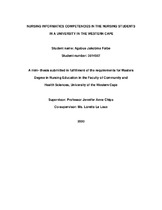NURSING INFORMATICS COMPETENCIES IN THE NURSING STUDENTS IN A UNIVERSITY IN THE WESTERN CAPE
Abstract
Background: The increasing use of technology and informatics in the provision of nursing care encourages the consideration of whether final year undergraduate nursing students are prepared for the use of informatics in clinical care and what the current state of knowledge, skills and attitudes on nursing informatics is.
Purpose of the study: The overall aim was to investigate the perceived relevance, competencies in nursing informatics and attitudes towards nursing informatics of the final year undergraduate nursing students at a selected University in the Western Cape.
Methodology: A quantitative research approach using a descriptive survey design was used in the study. Self-administered questionnaires were used to investigate final year undergraduate nursing student’s perceived relevance of informatics skills for nursing, the perceived level of nursing informatics competence, and attitudes towards nursing informatics. Nursing students currently enrolled in the fourth year in their undergraduate bachelor nursing degree programme were the target population for this study (n=198). Frequencies of the perceived relevance of computers literacy skills, informatics literacy and information management skills for nursing, and competencies in computers skills, informatics literacy and information management skills and attitudes towards informatics were calculated and presented.
Results: The findings suggested that even though only 28% (n=28) and 4% (n=4) of nursing students has attended computer and informatics classes respectively, 99% (n=99) confirmed that they perceive nursing informatics as relevant in nursing education and nursing practice. Computer literacy skills (4.23 sd 0.8) were rated more relevant

